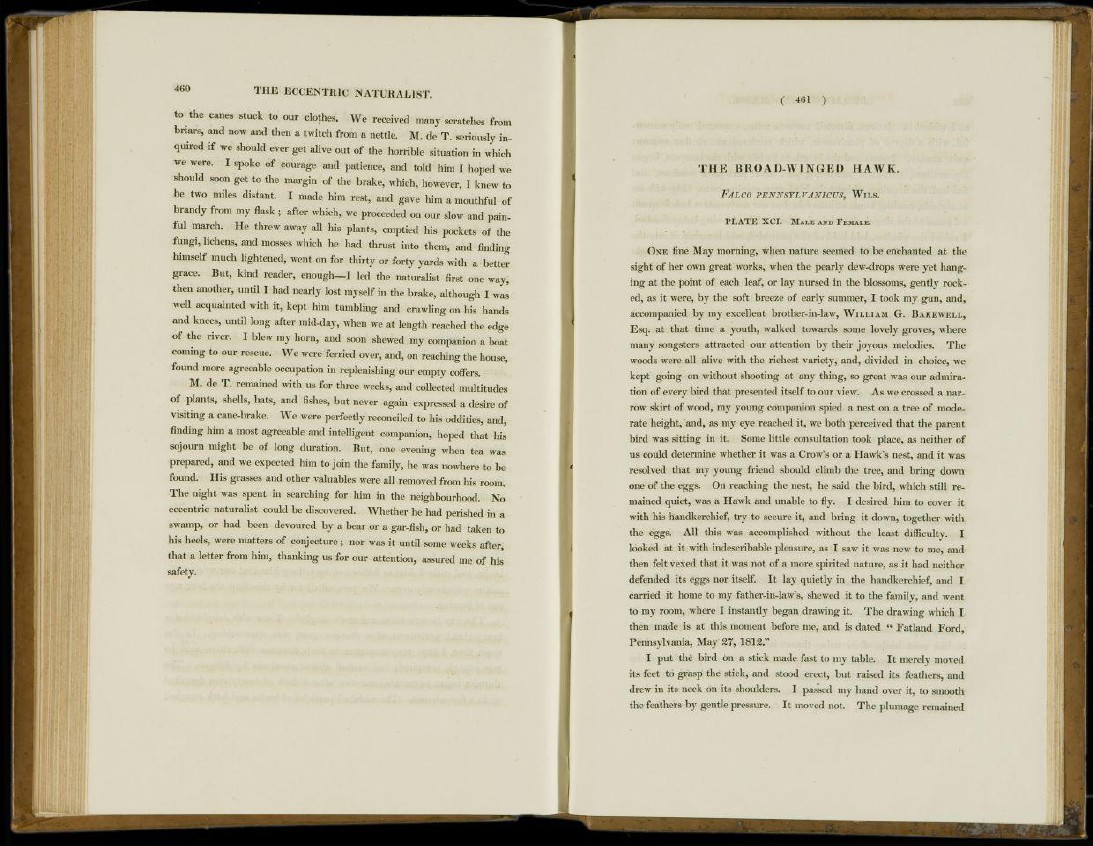
460 THE ECCENTRIC NATURALIST.
to the canes stuck to our clothes. We received many scratches from
briars, and now and then a twitch from a nettle. M. de T. seriously inquired
if we should ever get alive out of the horrible situation in which
we were. I spoke of courage and patience, and told him I hoped we
should soon get to the margin of the brake, which, however, I knew to
be two miles distant. I made him rest, and gave him a mouthful of
brandy from my flask ; after which, we proceeded on our slow and painful
march. He threw away all his plants, emptied his pockets of the
fungi, lichens, and mosses which he had thrust into them, and finding
himself much lightened, went on for thirty or forty yards with a better
grace. But, kind reader, enough—I led the naturalist first one way,
then another, until I had nearly lost myself in the brake, although I was
well acquainted with it, kept him tumbling and crawling on his hands
and knees, until long after mid-day, when we at length readied the edge
of the river. I blew my horn, and soon shewed my companion a boat
coming to our rescue. We were ferried over, and, on reaching the house,
found more agreeable occupation in replenishing our empty coffers.
M. de T. remained with us for three weeks, and collected multitudes
of plants, shells, bats, and fishes, but never again expressed a desire of
visiting a cane-brake. We were perfectly reconciled to his oddities, and,
finding him a most agreeable and intelligent companion, hoped that his
sojourn might be of long duration. But, one evening when tea was
prepared, and we expected him to join the family, he was nowhere to be
found. His grasses and other valuables were all removed from his room.
The night was spent in searching for him in the neighbourhood. No
eccentric naturalist could be discovered. Whether he had perished in a
swamp, or had been devoured by a bear or a gar-fish, or had taken to
his heels, were matters of conjecture ; nor was it until some weeks after,
that a letter from him, thanking us for our attention, assured me of his
safety.
T H E B R O A D - W I N G E D H A W K .
FALCO PENNSYLVANICUS, WILS.
P L A T E X C I . MALE AND FEMALE.
ONE fine May morning, when nature seemed to be enchanted at the
sight of her own great works, when the pearly dew-drops were yet hanging
at the point of each leaf, or lay nursed in the blossoms, gently rocked,
as it were, by the soft breeze of early summer, I took my gun, and,
accompanied by my excellent brother-in-law, WILLIAM G. BAKEWELL,
Esq. at that time a youth, walked towards some lovely groves, where
many songsters attracted our attention by their joyous melodies. The
woods were all alive with the richest variety, and, divided in choice, we
kept going on without shooting at any thing, so great was our admiration
of every bird that presented itself to our view. As we crossed a narrow
skirt of wood, my young companion spied a nest on a tree of moderate
height, and, as my eye reached it, we both perceived that the parent
bird was sitting in it. Some little consultation took place, as neither of
us could determine whether it was a Crow's or a Hawk's nest, and it was
resolved that my young friend should climb the tree, and bring down
one of the eggs. On reaching the nest, he said the bird, which still remained
quiet, was a Hawk and unable to fly. I desired him to cover it
with his handkerchief, try to secure it, and bring it down, together with
the eggs. All this was accomplished without the least difficulty. I
looked at it with indescribable pleasure, as I saw it was new to me, and
then felt vexed that it was not of a more spirited nature, as it had neither
defended its eggs nor itself. It lay quietly in the handkerchief, and I
carried it home to my father-in-law's, shewed it to the family, and went
to my room, where I instantly began drawing it. The drawing which I
then made is at this moment before me, and is dated " Fatland Ford,
Pennsylvania, May 27, 1812."
I put the bird on a stick made fast to my table. It merely moved
its feet to grasp the stick, and stood erect, but raised its feathers, and
drew in its neck on its shoulders. I passed my hand over it, to smooth
the feathers by gentle pressure. It moved not. The plumage remained